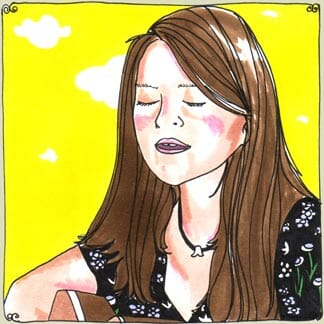- Welcome to Daytrotter
- If Silence Means That Much To You
- Acid Test
- Paper and Glue
- Limbs
And now, for her next trick, Emma Pollock will give you all of the familiarity and surprise you could ever want for, in cahoots with each other, just as the red and white tandems flirtatiously and perversely in the peppermint. She raises the kinds of toasts to situations that aren’t really spellbinding or noteworthy on any sort of scale measuring ogling or doe-eyed looks of jealousy. These aren’t the speeches from the best man or the maid of honors. Pollock, the former member of Scottish band The Delgados, honors the creaky porch swing that just holds dear memories and those who might be moralistic, but only in an almost imperceptible way.
You know those hours of desperation that are always written into sitcoms and chick flicks where the grieving and moping displaced lady slides into bed or onto a couch with a pint of Ben & Jerry’s Cherry Garcia or something equally fattening and just goes forth vegging out? Pollock doesn’t praise these moments because that would make her kind of depressing, but like her sorta labelmate Jennifer O’Conner, she gets her kicks with the generic (not in interest, mind you) calamities and sour notes that befall regularly and in tumbles. Funny, isn’t, how such common feelings can raise themselves to such new and lucid dawnings depending on who’s talking through them.
There’s a lot of Pollock that unravels in such wonderful sadness, just the same way that Aimee Mann presents it. Though not as helpless or trapped in their predicaments, Pollock’s characters – frequently semi-autobiographical, or more so than Mann’s – show themselves acting with forlorn eyes gazing straight off into the distance and sluggishly singing in parked cars in a torrential downpour or a rich person’s home the way the characters on Paul Thomas Anderson’s motion picture “Magnolia” do. There would never be frogs nailing windshields and streets and tin roofs as they substituted rain in Pollock’s songs and there would never be an admission at the end of the film saying, “But it did happen,” for the fantastical never really happens. She might paint someone’s face in sunshine and breezes, but Pollock stays away from the abstract and works with the colors that we’re all given right in front of us, right before our reaching fingers.
She sings in a way that’s stripped of false mystifying and pretension – it’s frugal in its showiness, comfortable to just backstroke through the issues, not breathing hard, stroking the mattress of water too hard or putting up much of a splash, just being as forthright as possible. It’s as if she’s thrown open the shutters and emphatically tossed open the shades just to reveal a gray ass day outside, but before she allows herself the pitying party to stampede, she decides, “This will be the day that I catch up on all of the reading I’ve been meaning to do and I’ll heat up some homemade soup. It won’t be so bad kiddo.” It’s a cleansing record, this Watch the Fireworks, less climactic than the title would suggest, unless it means the dying embers falling like hot weeping willow branches quickly to the ground for burial, fading until they’re taken over by the night’s blackness. What’s not climactic in that though? Works for me.
